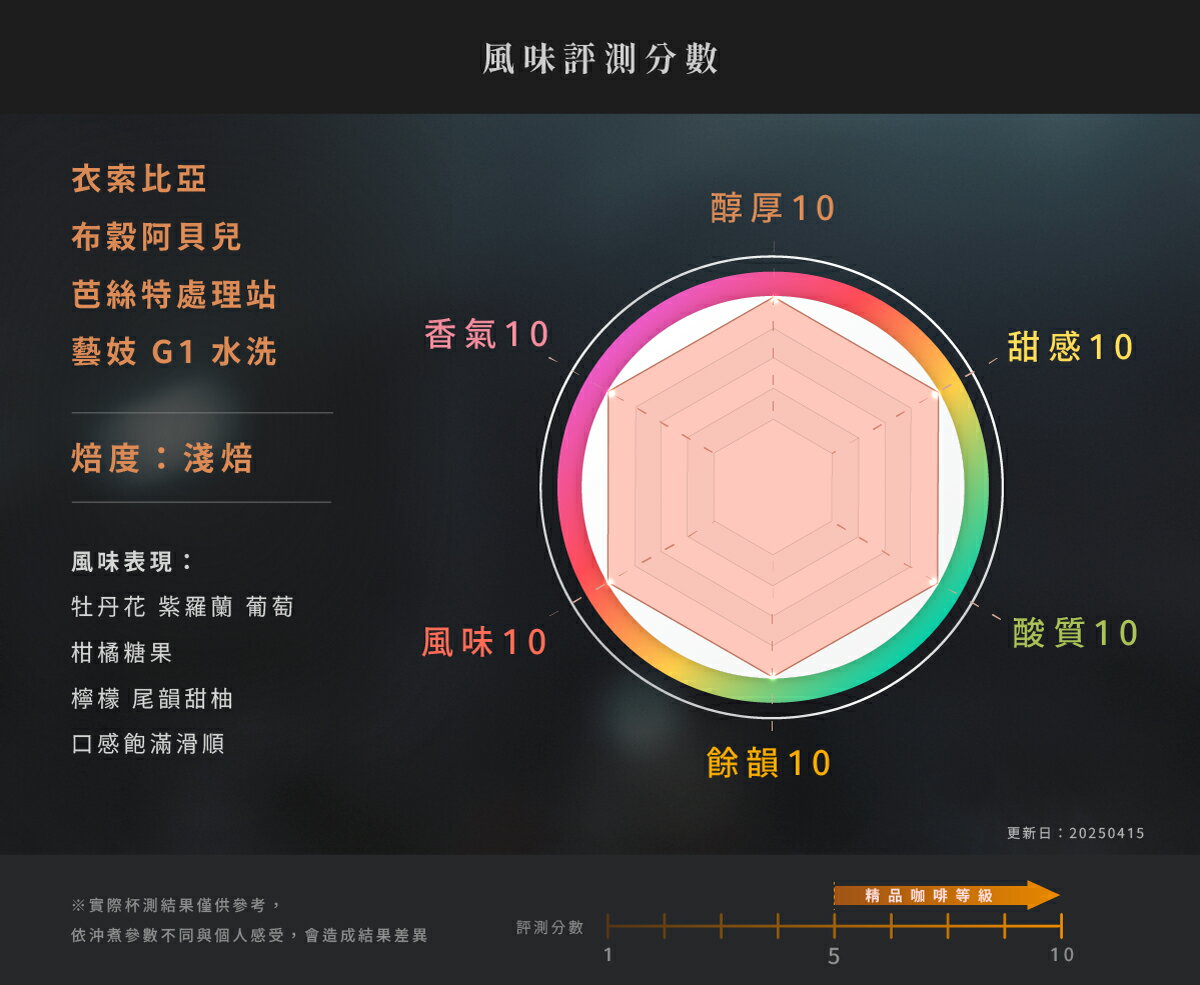

Ethiopia Guji Hambella Buku Abel Specialty Estate Coffee Beans. Options are as follows:
Ethiopia Guji Hambella Buku Abel Bastet Station Geisha G1 Washed

Ethiopia Guji Hambella Buke Abel G1 Anaerobic Natural









Coffee Flavor
The flavors of coffee are derived from the breakdown of various nutrients in the green coffee beans during roasting. Heat causes these compounds to degrade into a variety of aromatic molecular structures, resulting in a wide spectrum of flavors. High-quality coffee beans naturally possess a rich aroma that evolves at different temperatures—high, medium, and low—offering a delightful and nuanced experience worth savoring.
Ethiopia Guji Hambella Buku Abel Bastet Station Geisha G1 Washed
Peony, violet, grape, citrus candy, lemon, sweet pomelo finish, full-bodied and smooth
Ethiopia Guji Hambella Buke Abel G1 Anaerobic Natural
Vibrant Floral Aroma, Honey, Lychee, Grape Juice, Hints of Whiskey, Sweet Peach, Fruity Gummies, Rich Layers with a Delicate and Sweet Complexity

Buku Abel is located in southeastern Ethiopia, in the Hambela area of Guji, a remote forest tribe at an extremely high altitude of 2300 meters, with a population of about 30,000. Like most coffee farms in Ethiopia, it grows in the wild primary forest. Coffee farmers have passed it down for generations, growing native bananas and interspersing local native coffee trees in the banana forest. This village is mostly owned by estate families, with cows, sheep, horses, etc. roaming freely in the mountains and forests. Thanks to the family's experience of thousands of years, they can process coffee very accurately. The coffee produced in the production area is professionally cultivated. The coffee cherries are picked when they are fiery red and about to turn black with extremely high sugar content. They are sun-dried on African raised beds made of bamboo, under the high altitude but with plenty of sunshine. They are constantly turned on the African beds and can be sun-dried in 8-12 days.
The "Taste of the Harvest" flavor competition, organized by the African Fine Coffees Association (AFCA), is held in producing countries such as Kenya, Ethiopia, Malawi, Zambia, Tanzania, Congo, and Uganda. Each country first holds domestic evaluations, and then the domestic champions are sent to the AFCA for the final round of judging. In addition to winning the Ethiopian national championship in 2016, Buku Abel, in 2017, entered the transnational finals as the Ethiopian national champion with its sun-dried coffee, and finally lost to a Kenyan coffee by a narrow margin of 0.25 in the finals, taking second place. The following year (2018), the sun-dried Buku Abel finally won the championship. After being introduced to the mainland market, importers named it "Hua Kui" (花魁), while importers in Taiwan named it "Peony" (牡丹).
2018 Taste of Harvest Regional (Transnational) Finals Champion
2017 Taste of Harvest Regional (Transnational) Finals Runner-Up
2016, 2017 Ethiopian Taste of Harvest Sun-Dried Category Champion
----
A Shining Southern Star: Buku Abel - Baste Geisha / Geisha
Buku Abel is a mysterious growing region with various representative names. Now, through the green bean buyer's Red Circle Project, we can explore this precious land. Its stunning flavor profile is captivating at first sip, allowing us to experience the unique charm of this terroir. The Geisha coffee from the Baste washing station represents the pinnacle of specialty coffee. This year, we are particularly excited to offer this washed batch, inviting you to immerse yourself in the enchanting world of Geisha flavors.

Arabica Coffee Varietal - Geisha
Geisha coffee, once named one of the "World's Top 10 Most Expensive Coffees" by Forbes, is a legendary name in the world of specialty coffee. However, there is significant confusion surrounding the Geisha variety, as several genetically distinct plant types are referred to as Geisha, many of which share a similar geographic origin in Ethiopia. Recent genetic diversity analysis conducted by the World Coffee Research confirms that the T2722 variety cultivated in Panama is both unique and consistent. When well-managed in high-altitude regions, this variety is strongly correlated with exceptional cupping quality and is renowned for its delicate floral aroma, jasmine notes, and peach-like fragrance.
Regarding the name "Geisha," the spellings "Geisha" and "Gesha" are often used interchangeably. This is related to phonetic transliteration, as there is no fixed translation from Ethiopian dialects to English. The variety was originally recorded as "Geisha" in planting records. Over the decades, coffee researchers and cultivation databases maintained this spelling, leading to its widespread promotion and use within the coffee industry. The variety was first collected from a mountain in Ethiopia, the name of which is typically translated into English as either "Gesha" or "Geisha."
In recent years, the cultivation of the Geisha variety has gained popularity worldwide, achieving remarkable success in major coffee competitions. This includes regions in Central and South America such as Guatemala, Costa Rica, El Salvador, Colombia, and Peru, where the variety has often been transplanted from Panama's T2722. Additionally, Taiwan has also begun cultivating Geisha in many high-altitude regions. Typically, the higher the elevation, the more enchanting the coffee’s flavor becomes.
Arabica Coffee Varietal - Heirloom
Arabica coffee originates from Ethiopia in Africa. To this day, there are hundreds and thousands of wild coffee species within Ethiopia, many of which grow year-round in pristine forests. These indigenous wild species have undergone countless local evolutions, including hybridization, mutation, and crossbreeding, resulting in a vast gene pool of native varieties known as the Arabica gene pool. The native varieties produced within Ethiopia are referred to as Heirloom (古優原生種).
Grade 1 (G1) is the highest grade in the Ethiopian coffee grading system.
 (Coffee Processes)
(Coffee Processes)
The term "processing methods" refers to the process of transforming ripe red coffee cherries into dried green beans. Each method has its advantages and disadvantages, influenced by the natural environment and the specific needs of the coffee-producing region. As a result, different regions adopt the processing method most suited to their conditions. This batch uses washed or natural processing methods, described below:
【Washed Process / Wet Processed】
Also known as the wet process, this method involves removing the skin and pulp of the coffee cherries before drying. The seeds are then fermented in water tanks to eliminate the remaining mucilage on their surface, followed by thorough washing and drying under sunlight or with mechanical dryers.
The washed process produces a cleaner and crisper flavor profile compared to the natural process. Coffees processed this way typically have lighter body, brighter acidity, and distinct fruit flavors. This method is often associated with specialty coffee due to its clarity and vibrant flavor expression.
【Natural / Sundried / Dry Processed】
Also known as the natural drying method or unwashed process, the natural process is one of the most traditional and widely used methods of coffee processing. This process enhances the coffee's sweetness and body, often resulting in unique and distinctive aromas.




JUSTIN INTERNATIONAL FOOD ENTERPRISE CO., LTD.
Tel: +886-3-358-6611
1st Floor, No. 30, Lane 120, Daxing Road, Taoyuan District, Taoyuan City
▶This product is covered by a NT$10 million product liability insurance.
▶Food Industry Registration Number: F-165601955-00000-0
▶ Our company’s cupper is certified as a CQI International Coffee Quality Appraiser.



Recommended Products


※ 詳細出貨及付款說明、發票、海外訂購須知...等,請 點擊進入